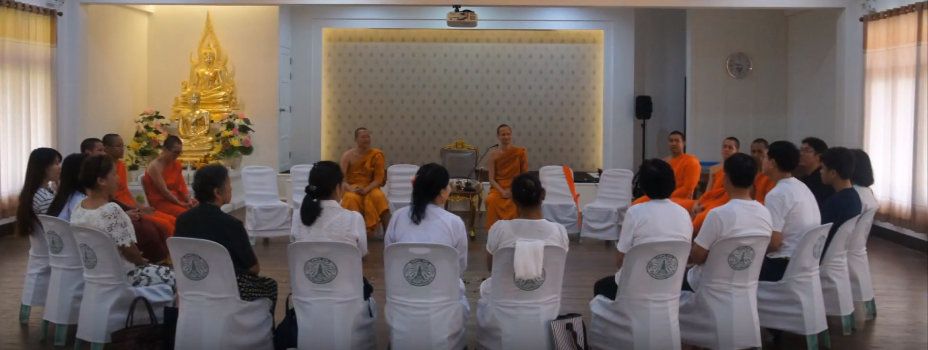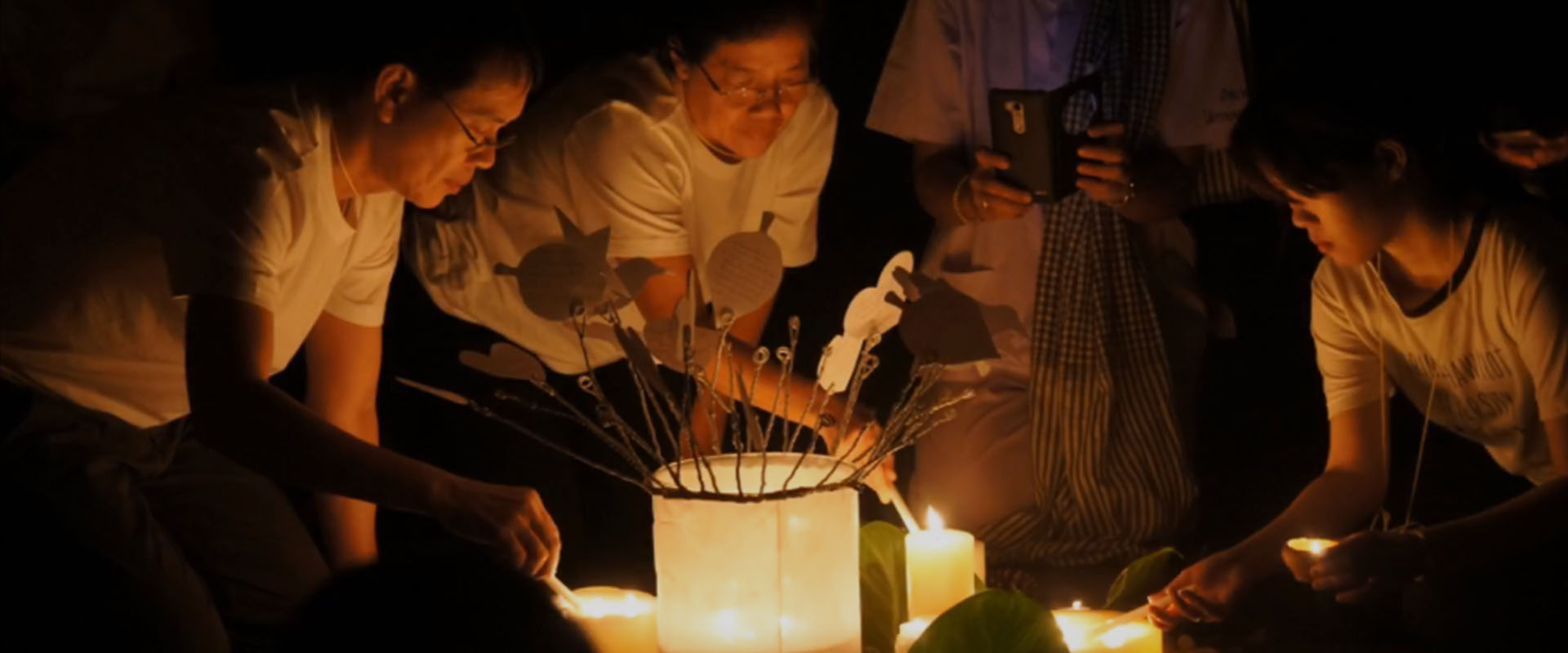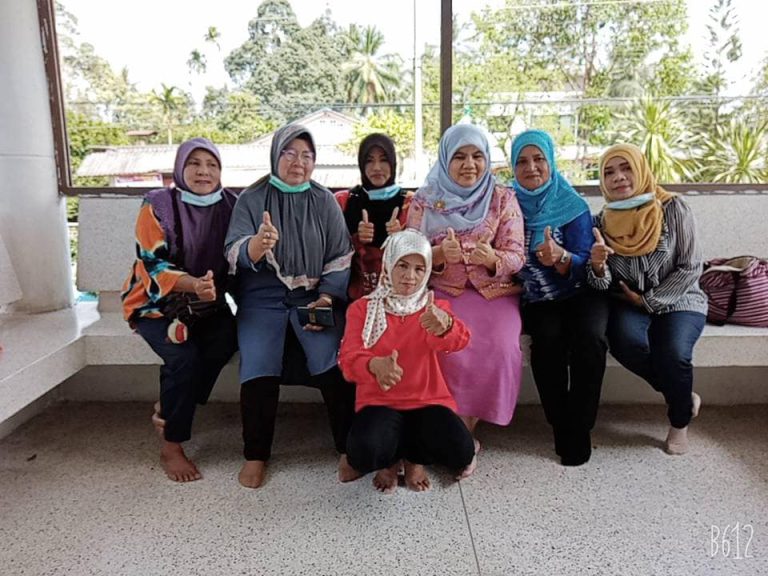Story: Woraphong Wechamaleenonda
Everyone will have to contend with the death or loss of a loved one someday, so it probably seems like a normal fact of life. However, the impact of loss can be much more severe than many assume, and can give rise to a spectrum of mental illness: depression, in particular, disrupts one’s ability to function in daily life, and many depressed individuals are unable to resume living like normal and may engage in self-destructive behavior if they do not receive timely support. Therefore, it is important to attend to grief after loss, because studies conducted abroad have shown that many people dealing with feelings of sadness and grief after loss will have significantly shorter life spans if they do not receive the support they need.
The Gilanadhamma organisation consists of a group of monks that do volunteer work to address the suffering of people in Thai society. One facet of their volunteering is patient visits, through which they witnessed and began to understand the correlation between loss and depression. Therefore, they have created a guide to healing from the loss of loved ones that is based on the dhamma and buddhist teachings.
‘Meditate for Love’ is the shorthand for “Meditation Training for Those who have Lost Loved Ones”, which was founded in 2010 out of efforts to design a workshop to help people who had experienced the loss of loved ones heal from grief. The workshop is a component of a master’s thesis titled “Effects of Buddhist Workshops that Emphasize Buddhist Principles and the Afterlife on the Grief of People who have Lost Loved Ones” written by Phra Panot Khunwatho (now known as Phra Khru Methangkorn of Wat Nyanavesakavan), a member of Gilanadhamma. His mother passed away before he ordained as a monk, and he drew on his study of the dhamma to tend to his grief over the loss of his mother, his unresolved feelings and other various anxieties. His most salient concerns centered on the nature of life after death: when we die, in which world will we be reborn? If we die in distress, or in an accident, is that an inauspicious death or not?
He found that the buddhist canon provided clear answers to his questions: the world in which each person is reborn is determined by the kind of karma they have manifested in their life. Everyone has their own karmic legacy, so our suffering and sadness at someone’s death is not productive because it does not make extra merit for the deceased in any way.
Knowledge of the dharma and afterlife has healed his sadness, anxieties, and unease over the way he treated his mother before he became ordained, until it has all faded away. Therefore, Phra Panot centers the buddhist teachings in his approach to healing and his workshops for people who have lost family and friends, so that they receive the knowledge that helped him. Not only does it heal those who are grieving, and bring them back to living their life as before, it improves lives and cultivates wisdom.

Experiential Learning
After creating “Meditate for Love” from the buddhist principles and his personal discoveries, Phra Panot invited a group of participants between the ages of 24-77, all of whom had lost a loved one, to a 4-day/ 3-night trial workshop as part of his master’s thesis at the Wat Bangchangnua’s Nakprasith Training Centre in Sam Phran, Nakorn Pathom in 2010.
The workshop did not solely consist of dharma lectures, but centered activities and processes that would help participants apply the dharma to their own experiences and foster connection and exchange within the group. The participants would gradually learn to employ the dharma in healing their grief, and work towards the realization of the threefold way, the four foundations of mindfulness and the four noble truths, which become tools for healing and caring for oneself that participants can use for the rest of their lives. Each day is divided between three activities: 1. Group counselling 2. Study of dharma 3. Meditation processes, such as prayers, mindfulness sessions, and different ways of practicing awareness and observation.
Beginning with “somatic meditation”, the training of physical and verbal behavior by using the senses and one’s attention to become aware of one’s external surroundings. This is followed by “sila phawana” (meditation on virtue), which concentrates on one’s relationships to one’s surroundings and other people. Those suffering from loss tend to fixate the source of their sadness, so this practice invites participants to direct intimacy beyond their immediate family to the other people in the workshop, who have all experienced and understand loss. This fosters love and connection among participants, and creates an atmosphere of openness, which allows the rest of the workshop to proceed smoothly.
Next is “jit phawana” (meditation of the heart): spiritual development through the practice of attentive listening and empathy; self-care in a safe space where repressed feelings and vulnerabilities can be openly expressed. This process is conducted through a group counselling session, and is directed towards helping participants attain self-awareness. Only then will different levels of the dhamma be introduced in order for participants to gradually understand and integrate the dhamma into their sense of self in an organic way. Notably, when a teaching resonates with a deeply-held anxiety or question, it rings true as an answer that can bridge the gaps in one’s understanding and give rise to “wisdom”.
A tangible activity in the ‘Meditate for Love’ curriculum is the brewing of butterfly pea tea in small groups every morning. This routine, which starts off the first day of the workshop, enlivens the physical, moral, spiritual and intellectual dimensions of being at once. On the first morning of preparing tea, the monk leading the small group pours a cup of tea for a participant, who then pours a cup for the next participant, and so on around the circle. Everyone slowly sips the tea, letting its smell and taste engage their senses, and savoring it with the heart and mind. Only after drinking the tea will the monk ask the participants to discuss what they have learned in the previous days’ activities; the conversation naturally moves on to the group sharing stories of their loved ones, which helps participants heal with each other. The next morning, the tea meditation is a degree more advanced: the participants use their senses, such as sight and smell, to perceive the cup of tea before them, and examine the feelings elicited within them, to practice mindfulness in each moment. On the third day, the monk discusses the five aggregates (Skandha) and their interrelation, which enables participants to distinguish thought from feeling with clarity. Then, the group reflected on what they had learned through the tea meditation practices on the final morning, which revealed that many participants felt like they had a more profound understanding of life through the process.
When experiential learning, such as the tea meditation, is integrated with an approach to treating inner anguish based on the 4 noble truths to create a curriculum that guides participants towards the recognition of the nature and source of their suffering. They will then begin to understand and release their pain. Their suffering disappears, and whatever had still been lodged in their hearts will fade away.
The evaluation of the workshop, through the use of a metric of sadness based on an aggregate of five categories ( emotional, mental, physical, social and spiritual), found that participants were able to let go of their sadness and enhance their ability to engage with their lives.
The Pediatric Palliative Care Center at the Pediatric Department in the Siriraj Hospital Faculty of Medicine, which partners with Gilanadhamma as part of their care for pediatric patients and their families, was interested in the success of the trial workshop and invited Gilanadhamma to facilitate a workshop on tending to grief for parents who have lost a child. As a supplement to the hospital’s palliative care services, which usually has psychiatrists follow up with parents and provide bereavement care via a phone call, the workshop helped to concretely reduce parents’ grief, and has been consistently held for many years since.
In addition to working with the Pediatric Palliative Care Center, Gilanadhamma has also organised workshops with other groups of people — when there is an opportunity and adequate support — up to the present.
One Step at a Time
It is evident that ‘Meditate for Love’ is a curriculum that requires much sensitivity and tact; therefore, it has many elements that make expansion a challenge. Take the demands on workshop staff, for example: the workshop requires a staff that is well-versed in buddhist practice, buddhist philosophy and group counselling, which only 10 members of Gilanadhamma are qualified for at the moment. Since they all have many other responsibilities, they have to lead the workshop in turns.
The workshop has a capacity for no more than 25 participants in accordance with the number of workshop counsellors and the nature of the curriculum, which hinges on intimacy. It is not suitable for large groups. A sufficient period of time between the event of loss and the workshop is also necessary; those who have just experienced loss, or have intense feelings of grief that exceed the capacity of the workshop, require private counselling, and are not suited for a group workshop. Not to mention, all of Gilanadhamma’s workshops are free for all participants, and therefore require external sponsorship. As a result of these conditions, ‘Meditate for Love’ has only been organised 11 times (the trial workshop included) since 2011.
Cognizant of these limitations, Gilanadhamma has been focused on training a new generation of facilitators. Initially, Phra Khru Methangkorn, Phra Khru Thammarat (Thanachai Techapanyo) and the original members of Ghiladhamma organised the workshops themselves. Nowadays, they have stepped back to support and give the new generation of proteges the opportunity to learn how to facilitate workshops, which is a long training process. Supporting individuals that have lost loved ones is one of the most difficult tasks in the sphere of counselling; a group counselling program must be led by someone sufficiently experienced in different forms of counselling — only then will they be able to counsel those who have suffered loss. As a result, this facet of Gilanadhamma’s work is slow-growing. However, if other monks or organisations are interested in emulating their workshop, Gilanadhamma will give suggestions, advice and support them to the best of their ability.
Most recently, the Buddhadasa Indapanno Archives are set to sponsor a ‘Meditate for Love’ workshop in 2019, allowing Gilanadhamma to continue organizing the workshop.
Towards a Compassionate Community
‘Meditate for Love’ also attests to another important phenomenon: in addition to helping those who have lost loved ones heal from grief and move on, the workshop creates an intimate and caring community out of people who have certain experiences in common. The community members support and keep in regular contact with one another; they also encourage each other to do good deeds through different avenues such as volunteering, or practicing the dharma, after the workshop. The community grows and embraces new members beyond the workshop. One could say that it is one form of compassionate community that Thai society and the world needs.
That being said, ‘Meditate for Love’ is only one branch of Gilanadhamma’s activities. The primary purpose of an organisation that tends to people’s suffering is not limited to those who have experienced loss, but to the improvement of people’s lives through the dissemination of buddhism. They do not sermonize; instead, they teach buddhism in order to give people a tool that they can use to manage their own suffering, whether from loss, disappointment, losing a job, heartbreak and all of life’s wounds, which can all be tended to in the same way.
If you are interested in the ‘Meditate for Love’ workshop or Gilanadhamma’s other programming, please look at the Gilanadhamma facebook page and website (www.gilanadhamma.org) for details.
The writer would like to thank Phra Khru Thammarat (Thanachai Techapanyo) of Wat Nyanavesakavan, member of the Gilanadhamma organisation, for the opportunity to interview him.
Photo credits: ภาวนา For LOVE ณ นคร #10: https://www.youtube.com/watch?v=jvsAWR9wpB8, YouTube channel: Pam B.
Important people mentioned: Phra Panot Khunwatho (Phra Khru Methangkorn) and Phra Khru Thammarat (Thanachai Techapanyo)



